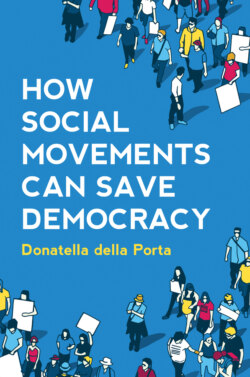Читать книгу How Social Movements Can Save Democracy - Donatella della Porta - Страница 7
1 Democratic Innovations and Social Movements
ОглавлениеThe Great Recession that hit the world in 2008 worked as a critical juncture, nurturing socioeconomic but also political transformations. Some of the political developments during the crisis have challenged civil, political and social rights, triggering a Great Regression (Geiselberger 2017). Increasing social inequalities have spiralled, with growing mistrust in established institutions fuelling a sense of insecurity and xenophobic reaction (Streeck 2017; Bauman 2017a). While scholars are debating how much inequality democracy can withstand without breaking down (della Porta, Keating et al. 2018), resistance to the backlash is also developing, with citizens mobilizing for social justice and ‘real democracy’ (Meyer and Tarrow 2018).
This volume will focus on some innovative proposals, emerging from progressive social movements, that aim at increasing participation and deliberation in order to save democracy. Exploiting windows of opportunity offered by institutions of direct democracy, social movements have promoted referendums or infiltrated ‘from below’ referendums promoted by other actors in a more top-down fashion (della Porta, O’Connor et al. 2017a). Party systems have been dramatically shaken, with the breakdown of mainstream parties and, in some cases, an unexpected rise of movement parties on the left (della Porta, Fernández et al. 2017a), as well as right-wing populist ones. Similarly unexpected success has come to candidates that appeal to social justice and citizens’ participation within old-Left parties, among them Labour in the United Kingdom and the Democratic Party in the United States. In addressing these developments, I suggest that times of crisis are times of rapid change, presenting challenges to existing institutions but also, potentially, opening opportunities for a deepening of democracy.
This chapter will introduce the theoretical discussion on the potential innovative contributions by civic society that have indeed been addressed in democratic theory, as well as in various approaches within social movement studies. While movements have been studied mainly as contentious actors, fighting in the streets to resist or promote political change, social movement studies have also pointed at their capacity to nurture innovative ideas, as movements are constantly engaged in generating and spreading counter-expertise and new forms of knowledge. In doing so, social movements are endowed with specific ontological, epistemological and methodological preferences. This chapter therefore addresses the channels through which social movements’ ideas enter institutions, singling out conditions that favour (or thwart) the development of innovative ideas and plural knowledge. It suggests that, by providing for alternative knowledge, progressive movements might contribute to the deepening of democracy through increasing the plurality of ideas.
